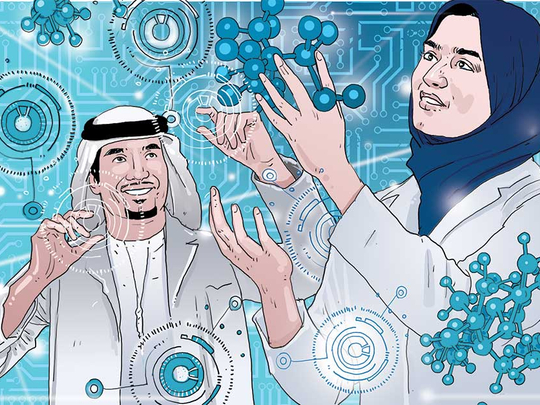
The UAE’s necessary ability to remain focused on its long-term future, despite the current political chaos in the Arab world, was on full display at the World Economic Forum’s annual meeting of Global Future Councils in Dubai this week. It is remarkable to find the government’s “passion about the future” in a country that has also committed so many troops to fighting the rebels in Yemen and has been in action in Iraq and Syria as part of the international and regional coalitions fighting Daesh (the self-proclaimed Islamic State of Iraq and the Levant).
The meeting of the Future Councils gathered more than 700 global experts into 35 topic-based councils. Some looked at significant areas of society affected by systemic change in the world like the digital economy, food security or urbanisation and combined them with other councils that looked at enabling factors for major change like the impact of advanced materials, biotechnology, blockchain, or human enhancement, while also watching out for the impact these technologies might have on society through further councils on areas like human rights and education.
The challenge facing humanity is how to work on these issues where humanity, biology and machines are increasingly intertwined so as to be ready to seize the opportunities in such profound changes rather than let the technology run amok and cause untold social damage.
There are ethical, legal, social and moral problems that will emerge from these changes, many of which are barely understood today.
Nonetheless, it is important to tackle these questions with confidence in order to seek to give a lead rather than drift and follow others.
The strong political direction from the UAE was described by Mohammad Al Gergawi, Minister for Cabinet Affairs and the Future, when he quoted His Highness Shaikh Mohammad Bin Rashid Al Maktoum, Vice President and Prime Minister of the UAE and Ruler of Dubai, saying “The future is owned by those who imagine it, design it and make it.”
The UAE has already taken some bold steps towards embracing the future that is being defined by the Fourth Industrial Revolution, according to Mirek Dusek, Head of Middle East and North Africa at the World Economic Forum. He pointed out that the World Economic Forum’s 2015-2016 Global Competitiveness Report identified the UAE as the 25th most innovative country in the world. This judgement was based in part on the way the UAE has targeted to have 25 per cent of its buildings 3D printed by 2030; that blockchain will become the foundation of its government services and that it is targeting to get 25 per cent of its power generation from clean energy by 2030.
Embracing new technologies
Dusek also looked around the Arab region and observed similar hopeful trends in several countries that have more commonly hit the headlines for political chaos. Jordan’s ‘Edraak’ is an online education startup geared towards native Arab speakers that is being used by almost one million people.
Refugee camps in Lebanon’s Bekaa Valley are embracing the ‘Internet of Things’, with sensors that monitor temperature conditions. Saudi scientists are exploring self-cleaning solar panels, which could be the transformation point for solar energy. Jordan’s refugee camps use United Nations High Commissioner for Refugees’ next-generation Biometric Identity Management System to link 300,000 refugees’ irises and fingerprints to their documentation, history and bank accounts.
Egypt recently built its first solar-powered village, with solar panels integrated into the design of homes.
These indicators of a willingness to embrace new technologies and ideas, despite the political mess, are very heartening. It means that people in leadership positions are well aware of the necessity of being ready to handle the fundamental changes coming from geopolitical, economic and social trends.
These were summed up by professor Klaus Schwab of the World Economic Forum when he addressed the opening session for the Global Future Councils in the presence of Shaikh Mohammad and pointed out that there are more opportunities in four main forces at work than threats, despite the turbulence and uncertainty.
Schwab listed first the impact of the Fourth Industrial Revolution with its increasingly rapid rate of development as technologies like robotics, nano-technology and bio-technology all combine to make a profound change in the work environment and society. Second was the slow growth of the global economy as its struggles to handle a 225 per cent global debt burden.
The third force is the change from a uni-polar to a multi-polar world, which includes a shift from a uni-conceptual to a multi-conceptual world, where there is decreasing agreement on the mechanisms for global governance, never mind the institutions that maintain it. And the fourth major issue is the multiple crises of identity that affects groups of people in the increasingly global world as they seek to assert their own identity and stand up against some of the effects of globalisation. In addition, there are non-state organisations that add their own fault lines into this process, sometimes violently and tragically.
The key to success in the world of tomorrow that emerged at the Dubai meeting was the importance of a willingness to embrace change. Comfortable ignorance or conservative resistance will fail.









